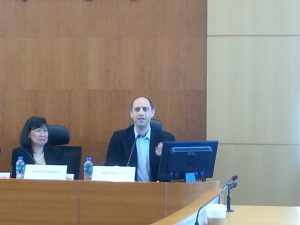Professor Bryan Mercurio (photo), Vice Chancellor’s Outstanding Fellow of Faculty of Law of the Chinese University of Hong Kong discussed “Amending the TRIPS Agreement to Promote Innovation” and posed some interesting What if… questions.
Professor Mercurio went directly to the point:
Since there is no conclusive answer to the question whether IP stifles or stimulates innovation, scholarship gives a mixed results depending on a multitude of factors, he wisely recommends further research on the correlation or causal relationship between IPRs (particularly patents) and innovation, including indirect benefits for innovation which patent protection may provide.
Professor Mercurio recommends to re-evaluate the purpose of the TRIPS Agreement. Is innovation a core part of the Agreement? And one should consider adding more detail to Article 27 (1) so as to ensure that it compliments rather than hampers innovation.
Professor Mercurio poses the question whether the current scope and duration of patent protection is suitable for all industries and sectors or whether some differentiation would benefit innovation. Professor Rader disagreed and tried to illustrate it with an example about fat cells in your chest and that the invention cannot be caught by one technology but moves across technologies. It seems to me that Professor Mercurio’s one size does not fit all, makes more sense. One could for example make the duration dependent to the redemption date of the investment plus some profit.
Another sound proposal of Professor Mercurio is adding a more direct and enforceable mandate in TRIPS in regards to patent protection, competition and innovation.
See Professor Mercurio’s slides here: http://www.lawtech.hk/wp-content/uploads/2015/01/Bryan-TRIPS-and-Innovation_HKU.pdf.
See more of the Worldwide Patent Law Reform and Hong Kong’s Response HKU Workshop here: http://www.ipdragon.org/2015/01/17/worldwide-patent-law-reform-and-hong-kongs-response-hku-worksop/

